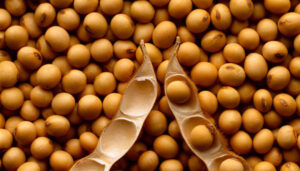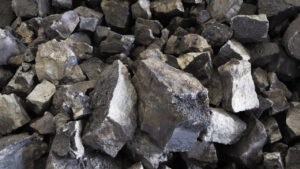
The tenth annual meeting of the Ukraine-EU Association Committee in Trade (ACTA) was held in Brussels, where issues related to Ukraine’s export duties on soybeans and rapeseed, as well as temporary restrictions on the export of unprocessed timber, were discussed, according to the Ministry of Economy, Environment, and Agriculture.
Ukraine informed its partners that a 10% export duty on soybeans and rapeseed was introduced in 2025 to support the development of agricultural processing within the country. At the same time, agricultural producers who export their own products are completely exempt from paying duties. Therefore, the mechanism introduced does not create additional financial costs for them.
“It is precisely through the proceeds from export duties on soybeans and rapeseed that the state will fill a special budget fund, from which programs to support agricultural producers are financed. First and foremost, these are programs for frontline territories, as well as grants for processing, greenhouses, orchards, compensation for agricultural equipment, insurance against military risks, and other key instruments. This allows us to maintain support for farmers even in wartime,” emphasized Deputy Minister of Economy, Environment, and Agriculture Taras Vysotsky.
The meeting participants also discussed decisions on regulating timber exports, including a temporary ban on the export of unprocessed timber (except pine) and the establishment of zero quotas until the end of 2025.
The Ukrainian side stressed that these measures are aimed at meeting the needs of defense and critical infrastructure, as well as reducing risks to the environment in wartime. At the same time, these measures prevent a shortage of raw materials on the domestic market.
It was separately noted that the Verkhovna Rada of Ukraine is considering draft laws on the formation of an updated timber market model, taking into account security challenges.
The Ukrainian side stressed the importance of continuing an open dialogue with the EU on all temporary measures that the state is applying during the period of martial law. At the same time, maintaining access for Ukrainian products to the European market remains one of the key factors for economic stability and support for national production.
The Ukraine-EU Association Committee in Trade Composition (ACTC) was established in accordance with Article 465 (4) of the Association Agreement between Ukraine and the EU to consider issues related to Section IV “Trade and Trade-Related Matters” of the Association Agreement. The CATS operates in accordance with the rules of procedure approved by Decision No. 1/2014 of the Association Council between Ukraine and the EU of 15 December 2014 “On the adoption of the rules of procedure of the Association Council, the Association Committee and its subcommittees”.
The Trade Committee meets annually and includes representatives from Ukraine and the European Commission.
As reported, a 10% export duty on soybeans and rapeseed for traders has been in effect in Ukraine since September 4, 2025. Agricultural producers who export their own products, or agricultural cooperatives that export the products of their members, are exempt from this duty, provided that the origin of the goods is documented. Until 2030, the duty will be reduced by 1% each year until it reaches 5%.
The Cabinet of Ministers has temporarily banned the export of unprocessed wood (except pine) until December 31, 2025, setting a zero quota for its export. This is done to provide the domestic market with raw materials, support Ukrainian woodworking enterprises, and stabilize the industry.

In the first 10 months of 2025, Ukraine exported 36,400 tons of honey worth over $84 million, with more than 70% going to European Union countries, Deputy Minister of Economy, Environment, and Agriculture Taras Vysotsky said during a forum on the European integration of Ukraine’s honey sector.
He noted that Ukraine is traditionally among the top five global honey exporters, continuing to develop beekeeping even in the difficult conditions of war.
“Ukraine is one of the leaders in honey exports to the EU. This testifies to the high quality, trustworthiness, and competitiveness of our products. The development of digital tools, modernization of production, and strengthening of quality control are gradually creating conditions for scaling exports not only to the EU but also to the markets of Asia and the Middle East,” he wrote on Facebook.
At the same time, Vysotsky stressed that Ukraine should ensure full compliance with EU standards and improve production traceability: clearly record where the honey comes from, which apiaries produced it, and how its quality was checked. This approach will open up new and long-term market opportunities for Ukrainian beekeepers.
According to Vysotsky, there are currently 62,697 apiaries and over 2.84 million bee colonies in the Apiary Passport Register.
“According to experts, integration into the EU market could increase Ukrainian honey exports by 25-30% in the next three years. Our task is to do everything possible to make this forecast a reality,” the deputy minister concluded.

In the first ten months of 2025, Ukraine increased imports of tin and tin products by 31.5% to $3.48 million, while exports decreased to $0.15 million.
In October, imports amounted to $0.41 million, and exports to $0.02 million.
In 2024, tin imports increased by 16.9% to $3.19 million, while exports amounted to $0.39 million compared to $0.16 million in 2023.
Tin is mainly used as a safe, non-toxic, corrosion-resistant coating in its pure form or in alloys with other metals. The main industrial applications of tin are in white tinplate (tinned iron) for the manufacture of food containers, in solders for electronics, in domestic piping, in bearing alloys, and in coatings of tin and its alloys. The most important tin alloy is bronze (with copper).

In January-October of this year, Ukraine increased its ferroalloy exports by 31.9% in physical terms compared to the same period last year, to 87,379 tons.
According to statistics released by the State Customs Service (SCS) on Wednesday, in monetary terms, ferroalloy exports increased by 25.5% to $98.064 million.
The main exports were to Poland (27.09% of shipments in monetary terms), Algeria (23.09%), and Turkey (21.52%).
In addition, Ukraine imported 32,255 thousand tons of this product in the first 10 months of 2025, a decrease of 58.4% compared to the same period in 2024. In monetary terms, imports fell by 53.5% to $61.045 million. Imports were mainly from Norway (19.49%), Kazakhstan (16.29%), and France (9.87%).
As reported, the Pokrovsky Mining and Processing Plant (PGZK, formerly Ordzhonikidze Mining and Processing Plant) and the Marganetsky Mining and Processing Plant (MGZK, both in Dnipropetrovsk region), which are part of the Privat Group, stopped mining and processing raw manganese ore in late October-early November 2023, while NZF and ZZF stopped smelting ferroalloys. In the summer of 2024, ferroalloy plants resumed production at a minimum level.
PGZK and MGZK did not produce any products in 2024, while in 2023, PGZK produced 160.31 thousand tons of manganese concentrate, and MGZK was idle.
In 2024, Ukraine reduced its exports of ferroalloys in physical terms by 4.45 times compared to 2023, to 77,316 thousand tons from 344,173 thousand tons. and in monetary terms, it decreased by 3.4 times, to $88.631 million from $297.595 million. At the same time, the main exports were to Poland (27.40% of supplies in monetary terms), Turkey (21.53%), and Italy (19.82%).
In addition, Ukraine imported 82,259 tons of this product last year, compared to 14,203 tons in 2023 (a 5.8-fold increase). In monetary terms, imports increased 3.3 times, from $42.927 million to $140.752 million. Imports were mainly from Poland (32.71%), Norway (19.55%), and Kazakhstan (13.9%).
The business of ZZF, NZF, Stakhanov ZF (located at NKT), Pokrovsky and Marganetsky GZK was organized by PrivatBank prior to the nationalization of the financial institution. The Nikopol Ferroalloy Plant is controlled by the EastOne group, created in the fall of 2007 as a result of the restructuring of the Interpipe group, as well as the Privat group.

During the full-scale invasion, Ukraine commissioned 3 million tons of oilseed processing capacity, with the same amount planned and under construction, so there were underutilized enterprises in the country, said Minister of Economy, Environment, and Agriculture Oleksiy Sobolev in an interview with Forbes Ukraina.
“In September, rapeseed oil exports increased 4.5 times compared to August, turning raw material exports into processed products. The state receives a fiscal effect from duties on soybeans and rapeseed, the proceeds of which are directed to a special fund to support the agricultural sector, in particular the frontline territories, i.e., the main goal of the duty is being achieved,” he commented on the results of the introduction of a 10% export duty on soybeans and rapeseed.
The minister noted that to ensure the proper functioning of this mechanism, the government adopted an experimental resolution stipulating that producer-exporters do not pay duties like the rest. In particular, the resolution specifies the method by which a producer confirms that they have grown a particular crop and are entitled to exemption from duties.
In addition, Ukraine is introducing monitoring through the State Agrarian Register to form a unified system of soybean and rapeseed exporters.
Sobolev added that a mechanism for exchanging information between customs and tax authorities is currently being developed with a view to transitioning to an automatic mode in the future. This will be an IT solution, similar to the electronic VAT administration system (SEA VAT), which will be operational by September 2026.
“After the end of the marketing years, we will be able to evaluate the results. Preliminary data already indicate an increase in the share of domestic processing of rapeseed and soybeans,” the Minister of Economy concluded.

Novokramatorsk Machine-Building Plant (NKMZ, Kramatorsk, Donetsk region) ended January-September of this year with a loss of UAH 108.9 million, while for the same period last year, net profit amounted to UAH 73.7 million.
According to the financial report published on the plant’s website, net income increased by 51% to UAH 1 billion 174 million.
NKMZ received UAH 268 million in gross profit, up 6%, with UAH 92.6 million in operating losses (UAH 2.4 million for the same period last year).
Products worth UAH 919.6 million were exported, accounting for 78.3% of total revenue (82% a year earlier).
India was the largest importer of products, with deliveries increasing by 15.5% to UAH 423.8 million. Exports to Lithuania increased by 57.5% to UAH 137.8 million, to Poland by 3.6 times to UAH 12.4 million, and to
Kazakhstan amounted to UAH 17 million compared to UAH 1.1 million last year.
Products were also supplied to countries to which there were no deliveries in January-September 2024, in particular, to Bulgaria – worth UAH 84.3 million, and China – worth UAH 48 million.
Deliveries to Ukrainian customers increased by 86.4% to UAH 254.7 million.
As reported, the plant ended the first half of this year with a loss of UAH 61.2 million, which is seven times more than in the same period last year, with net income more than doubling to UAH 795.5 million.
Thus, in the third quarter of this year, NKMZ incurred a loss of UAH 47.7 million, while in the same period of 2024, net profit amounted to UAH 82.2 million. Net income decreased by 5% to UAH 378.7 million.
“The company’s activities in the fourth quarter of 2025 and in 2026 will most likely be limited,” the report states.
NKMZ reminds that the company is located in the frontline territory, and the most important factor remains its activities “in the context of the Russian Federation’s military aggression against Ukraine.” This has led to a significant reduction in production volumes and has resulted in the irregular nature of production and economic activities. In particular, in October-December of this year, it is expected to manufacture and sell commercial products worth UAH 327 million, 5,000 tons of liquid steel (4,800 tons were produced in the third quarter), 300 tons of steel castings (284 tons), 3,600 tons of forgings (3,570 tons), and 5,700 model sets and packages (5,370) are expected to be produced and sold.
“The draft production plans for 2026 include 12,000 tons of machinery and equipment for the metallurgical, mining, and construction industries, lifting and loading and unloading equipment, and spare parts,” the report says.
According to the report, the value of contracts concluded but not yet fulfilled as of September 30, 2025, amounted to UAH 672.95 million. The expected profits from their fulfillment are UAH 171.87 million.
NKMZ is a city-forming enterprise in Kramatorsk, the largest in Ukraine in the production of rolling, metallurgical, forging and pressing, hydraulic, mining, lifting and transport, hydraulic and railway equipment.
As reported, NKMZ’s capacities were forced to be mothballed with the start of the full-scale military invasion of Ukraine by the Russian Federation, and on October 1, 2023, it began to partially resume operations.
The plant ended last year with a net profit of UAH 36.3 million, while in 2023, the loss amounted to UAH 856.93 million, and net income increased 3.2 times to UAH 1.15 billion, in particular, products worth UAH 941.3 million (82%) were exported.
For the current year, the plant has preliminarily planned to increase sales by 81.5% compared to 2024, to UAH 2.08 billion.
The number of employees at the beginning of 2025 was 5,660.